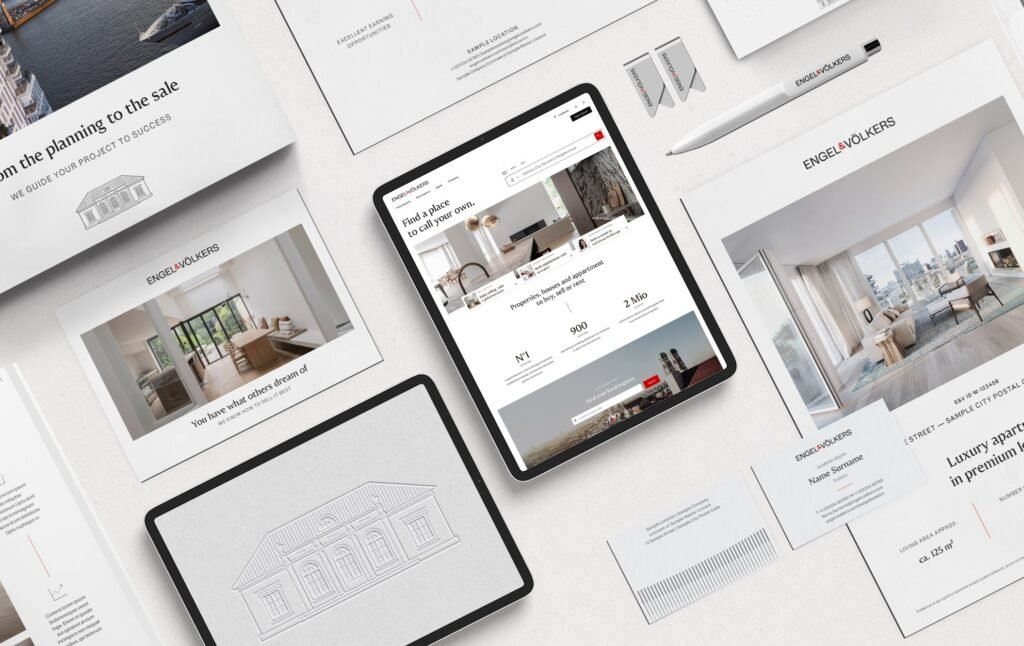
The real estate industry involves larger transactions, making it crucial for agents to establish a trustworthy persona to entrust property owners and potential buyers with their investments. Building a real estate website is a proven way to showcase professionalism and expertise, from initial planning to launch. This article provides a comprehensive guide to the procedure on how to make a real estate website.
Table of Contents
How to Make a Real Estate Website Step by Step
Starting a real estate website requires careful planning and commitment. Before starting, consider factors like starting from a suitable location, hosting the website, and generating passive income. This step-by-step guide provides a guide to creating a fully functional and complete website.
1. Select Your Domain and Hosting:
To create a real estate website, choose a memorable and relevant domain name, including real estate-related keywords. Use a domain name generator to brainstorm ideas. Search for available domains and buy them. Popular domain extensions like .com or.net can establish credibility. Secure a reliable hosting website, considering budget, traffic, and technical requirements. Choose a solution that aligns with your needs and supports your web presence growth.
2. Choose a Website Builder and Template:
With the help of a user-friendly website builder that simplifies website creation, requiring no coding skills and saving time and effort. It’s suitable for individuals and small businesses. When choosing a template, consider the overall look and feel, target audience, and brand. That offers customizable real estate website templates, allowing users to select a template that speaks to their brand.
3. Select Design for Real Estate Website:
Real estate requires a visually appealing and user-friendly website design to showcase properties and generate leads. Choose a suitable website builder and select suitable templates for your website design.
During the design phase, it is essential to take into account several factors here are these,
Call to Action Button Strategy:
- Convert website viewers into active clients.
- Strategically placed on homepage and website.
- Use phrases like “Schedule a showing” or “Contact us now.”
Website Navigation Planning:
- Reflect customer research process.
- Ensure easy navigation bar location.
- Use dropdown menus for subcategories.
Real Estate Website Mobile Friendly Capabilities:
- Enhances user experience with well-formatted mobile view.
- Essential for busy clients searching for properties on the go.
- Ensures easy mobile access for more visitors.
- Expands audience and keeps them engaged.
Real Estate Social Media Integration:
- Utilize platforms like Facebook, Instagram, and TikTok for wider reach.
- Integrate a social media bar with clickable icons on the real estate website.
- Test different content styles, like layered videos, to increase visibility.
- Place share buttons under content for easy sharing.
- Use relevant hashtags to connect with real estate content seekers.
Logo as a Real Estate Brand Identity:
- Your logo and real estate slogan are crucial aspects of your real estate brand identity.
- Logo and brand name should appear on for sale signs outside properties.
- Logo and slogan should be representative of business.
4. Add Properties and Visuals:
A real estate website is a digital platform where homebuyers can view properties. To create an effective website, highlight properties with images, videos, virtual tours, and 3D property viewings to engage clients and increase their search engagement. Each property should have its own page with detailed data and visuals, including photos, maps, key details, listing person, and contact information.
To compete in the online real estate market, include floor plans, local information, district ratings, price trends, and new listings. Visuals play a significant role in purchasing decisions, and 85% of home buyers found photos on property registry websites useful. To ensure quality and presentation, use a photo resizer to post images that meet standards for size, format, and resolution.
Click here to learn about Becoming a Real Estate Agent
5. Determine key real estate website features:
- Advanced search filtering and sorting: Use filters like price range, property type, location, number of bedrooms/bathrooms, square footage, and amenities to narrow down property searches.
- Contact info forms and live chat: Provide clear and visible contact forms for future clients. Live chat offers instant assistance and personalized experience.
- About us page: Introduce yourself, your team, values, mission statement, and awards in the real estate industry.
- Client testimonials and reviews: Showcase positive reviews and testimonials from satisfied clients to build credibility and trust.
- Registration and CRM system integration: Offer exclusive access to additional property facts or a personalized search. Integrate a CRM system to manage and streamline client information.
- Calendar integration for scheduling appointments: Make it easy for clients to schedule showings and book appointments directly on the website.
6. Optimize for Local SEO:
SEO is a strategy to enhance a website’s visibility in search results. It involves using location-specific keywords, meta tags, and headings to boost search engine rankings. Businesses can claim and optimize on local directories like Google My Business, Yelp, and Zillow, and create location-based landing pages for different neighborhoods or regions.
7. Launch Real Estate website:
Before launching a new website, thoroughly review content, designs, and functionality. Test with friends or colleagues for user experience. Once confident, attract leads and build your brand as a successful realtor. Regularly update your website to keep it relevant and fresh for new business.
Click here to learn more about Digital Marketing for Real Estate
Various Types of Real Estate Websites
The real estate website category encompasses various business types, with common examples including real estate websites are,
Property Listings:
A property listing website displays all homes for sale or rent in your desired area, allowing users to filter results by price, size, amenities, and location. Users can also submit requests to speak to an agent or book a tour through the site.
Agency Website:
An agency website serves as a marketing tool for a real estate agency, focusing on property listings, mission and vision, an About Us page, agent bios, contact information, and additional marketing material like a blog.
Real Estate Team Website:
A real estate team website, created by a single agent or a group, helps clients find their dream homes by specializing in specific areas and neighborhoods. These websites offer property listings and agency information, but also focus on the team’s expertise, highlighting their knowledge and expertise in the area.
Real Estate Investor Website:
A real estate investor website targets passive income investors, not homebuyers or renters. It offers opportunities to browse properties and search by property type. The website also promotes the investor group as a trustworthy authority, ensuring investors’ money is safe with the agency.
Property Manager Website:
Property managers play a crucial role in managing daily operations in multi-family dwellings, and property management websites assist in this process by promoting the property manager as reliable and trustworthy, serving as a central portal for residents.
Why do Real Estate Companies Need Websites?
A well-designed, fast, and informative website is crucial for real estate professionals. It helps agents reach potential buyers, as 97% of home buyers use the internet and 65% of younger millennials use mobile devices. A website streamlines day-to-day operations, from processing rental payments to requesting service, benefiting both the company and residents. It also makes real estate transactions more trustworthy by showcasing testimonials, case studies, and brand information. A website also reaches a wider audience, allowing real estate professionals to reach a global group seeking property or investment opportunities. In summary, a well-designed, fast, and informative website is essential for real estate professionals to reach their target market, streamline operations, build consumer trust, and reach a wider audience.
Conclusion
Building a real estate website is an essential step for professionals looking to establish credibility, reach a broader audience, and streamline operations. By following the steps outlined in this guide, you can create a visually appealing, user-friendly, and functional platform that effectively showcases your properties and services. Whether you’re an agent, investor, or property manager, a well-designed website helps you connect with clients, grow your business, and maintain a competitive edge in the digital marketplace. Embrace the power of technology to transform your real estate business and make a lasting impression in the industry.
